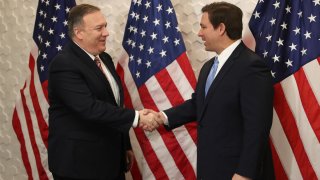
U.S. Secretary of State Mike Pompeo discussed Latin American affairs with Florida Gov. Ron DeSantis on Thursday, the day after the state Senate unanimously voted to condemn Nicaraguan President Daniel Ortega.
DeSantis and Pompeo hosted a roundtable discussion with prominent members of South Florida's Venezuelan community, as well as government and elected officials. It was closed to the press.
“He asked me to come down here to talk with a number of folks about the opportunities and challenges that are presented from the tyranny that is taking place both in Venezuela and Cuba,” Pompeo said in a phone interview with The Associated Press before the meeting. “We want economic relationships between the United States, between Florida and South and Central America to flourish.”
He said he planned to discuss what he learned on trips earlier this week in Latin America.
“I'll share with them the business that I had in South and Central America this past week and how we'll talk about how we can continue to develop those relationships while being very focused on ensuring that the people in Venezuela and Cuba have an increased opportunity for democracy and freedom.”
After the meeting, DeSantis expressed frustration that Venezuelan President Nicolas Maduro is still in power despite the United States and 60 other nations recognizing Juan Guaido as the nation's legitimate president.
“It's kind of been frustrating that if you went back a year, you know, a lot of us thought we were on the precipice of really seeing Maduro driven out of power and then having a pathway for free elections and a free society there. And yet, you know, here we are. And Maduro is still there,” DeSantis told reporters.
Local
The Florida trip also comes the day after the Florida Senate voted to condemn Ortega for the violent response his government had to protesters. Hundreds have been killed and thousands have been injured after protests escalated in April 2018 when cuts to social security benefits were announced.
The resolution passed by the Senate detailed how protesters were arrested and tortured. It also raised concerns about China's involvement with a massive canal project in Nicaragua.
“Far and away a greater threat than the Chinese Communist Party in Nicaragua is the threat that’s imposed upon the Nicaraguan people by Ortega and his family and the military around him,” Pompeo said.
Pompeo said he spoke with Nicaraguan opposition leaders this week and pledged U.S. support. He said the goal is free elections that he believes would remove Ortega, but acknowledged it's a challenge because Ortega has consolidated his power.
“You do a number of things. You are unequivocal about how you speak about it, so when we talk about the terror that has been inflicted on the Nicaraguan people by the Ortega regime, we’re clear about American value sets. Second, where there are people who need assistance — opposition leaders, those who have had to flee Nicaragua — we’ve provided financial assistance to some of them,” Pompeo said.
He said the U.S. is working with the Catholic church and others in the region, as well as other countries to press for a free and fair election.
"That’s all we’ve simply asked for and I’m confident that we’re closer today than we were just a few months ago,” Pompeo said.



